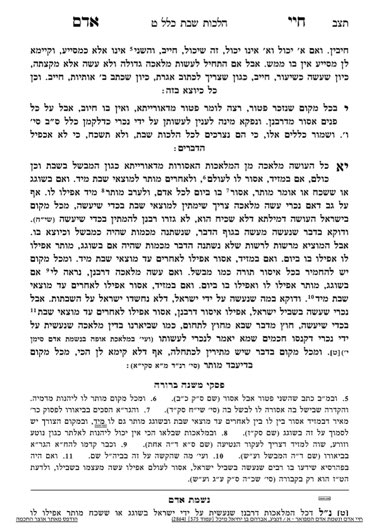Sponsorships for the upcoming Klalim, which discuss the 39 melachos of Shabbos, are available. Please contact Rabbi Reingold for more information at rabbireingold@gmail.com or 301.996.5910
We are beginning siman 11, which discusses the concept of maaseh Shabbos. We mentioned this concept earlier and learned that there is an opinion in the Gemara that if a person performs melacha on Shabbos, it is assur mideoraysa to benefit from the melacha. We do not pasken in accordance with this opinion, but rather pasken that maaseh Shabbos is an issur derabanan. It was enacted by Chazal in order to add to the disincentive for a person to transgress Shabbos.
We further differentiate between cases of shogeig and meizid. There is a machlokes what the halacha is by each, and a further machlokes between the rishonim how we pasken in this machlokes. This machlokes follows into the achronim as well.
The Chayei Adam writes that if one performs melacha which is an issur deoraysa b’meizid, such as cooking on Shabbos, it is assur for that person to benefit from that melacha forever, even after Shabbos. Others may benefit from it after Shabbos, but cannot benefit from the chilul Shabbbos on Shabbos itself.
If it was done b’shogeig, or the person forgot that it was Shabbos, or they thought the melacha was muttar, it is assur to benefit from the melacha on Shabbos to everyone, but once Shabbos is over, it is muttar to all, immediately once Shabbos ends.
The Chayei Adam clarifies that it is muttar to all immediately once Shabbos ends in order to contrast this halacha to a different halacha. If one asked a non-Jew to perform melacha in a scenario in which it was not muttar to perform amira l’akum, it is assur to benefit from the melacha until after Shabbos, and continues to be assur until enough time has lapsed that the Jew could have performed the melacha themselves. This concept is known as bichdei she’yaasu, Thus, the Chayei Adam clarifies that bichdei she’yaasu does not apply to maaseh Shabbos of a Jew. We will clarify why we do not apply bichdei she’yaasu to the maaseh Shabbos of a Jew in the upcoming shiur, be’ezras Hashem.
Summary
- Maaseh Shabbos performed b’meizid is assur to the person who performed the melacha forever, and assur to others until after Shabbos.
- Maaseh Shabbos performed b’shogeig is assur to all during Shabbos and muttar to all immediately after Shabbos.
- We do not apply bichdei she’yaasu to maaseh Shabbos of a Jew (but only to unauthorized amira l’akum).



